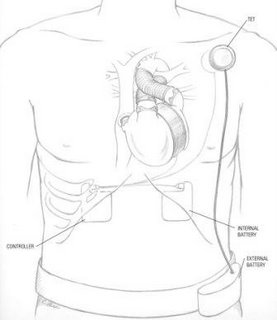Intelligent Design - Would Dawkins Argue for Design If It Would Save His Life?
Modern Medicine faces a crisis! Millions of dollars of medical equipment is at risk of being misplaced, improperly maintained, and possibly lost forever. Patients’ lives are at stake.
The FDA has approved the AbioCor fully implantable artificial heart for dying heart failure patients who are too old or too sick for a heart transplant. Incredibly, once implanted, these artificial hearts may be “lost”. According to many Darwinists, biological sciences supposedly have no ability to distinguish between a natural vs. intelligent cause, so some years down the road, society is at risk that neither X-ray, open heart surgery, inspection, or direct visual comparisons will be able to distinguish an artificial heart derived via intelligent causes from a real human heart (which biologists claim is the result of the purposeless forces of natural selection acting upon random mutations).
Imagine the scenario where:
- the original surgeon who implanted the artificial heart is no longer living
- the patient is unconscious
- the patient’s medical records are missing or destroyed
- Complexity won’t help, biologists already tell us the eye and brain are naturally evolved structures, so the observed complexity of the artificial heart won’t make the case for detecting the design of the artificial heart
- Function won’t do it, biologists already tell us the flagellum is naturally evolved and its mega-rpm propeller far exceeds the beats per minute of any heart
- Form won’t do it, we can’t assume that metal, plastic, or even a battery is the product of intelligent cause, for that’s simply a ‘god-in-the-gaps’ approach we are told. Give research more time and funding, they simply haven’t yet found the natural law that is responsible for making ni-cad batteries!
- Here’s the clincher (we might think). Information was found in the hearts ROM chip with instructions to increase the heart beat during certain physiological conditions. But wait, information is no empirical marker of intelligence, for monkeys with typewriters, or sticks in an ocean wave, both leave informational patterns on the medium of paper and sand.
Of course the biological community is not this badly misinformed about the difference between the causal factors of natural law, random chance, and design.
Imagine our hypothetical patient is the brilliant, Neo-Darwinist Richard Dawkins. Also imagine:
- that he knows he’s had an artificial heart transplant
- the original surgeon has died
- and his medical records are lost
 Much to his chagrin, it’s time for a battery replacement and no one in the medical community believes Dawkins when he claims he has an artificial heart. He knows, however, if he doesn’t get the new battery, he dies.
Much to his chagrin, it’s time for a battery replacement and no one in the medical community believes Dawkins when he claims he has an artificial heart. He knows, however, if he doesn’t get the new battery, he dies.
What would Dawkins do?
- Would he appeal to our common sense, believing that we can simply tell from the intrinsic properties of the artificial heart that it’s not a product of natural law or random chance? (Can’t you foolish people see this was designed, now replace the battery!)
- Would he attempt to locate some portion of the artificial heart that is irreducible complex and then begin to argue Dr. Behe’s case that irreducible complexity is a result of intelligent design?
- Would he focus on the informational content of the ROM chip and argue that complex specified information is the result of intelligent design, not natural law or chance?
Lee Penick



2 Comments:
I wonder why manatees were designed (presumably inteligently) to have hoofs at the ends of their fins... Evolutionary science explains it easily, can ID do it? Greetings :)
Oddities may be caused by a mutation, and natural selection may not have weeded the odd feature out. This does not demonstrate that undirected mutations and natural selection have the ability to begin life or take it from a simple beginning to a much more complex state.
Mutations exist, you need to show that they are the causal factor for the effect in question...going from single cell life to complex life such as humans.
From an ID perspective, just because "you" do not know the purpose for a specific attribute, does that necessarily mean the designer does not have a purpose for including the attribute in the design? In other words, is the universe's set of knowledge limited to your set of knowledge?
Fortunately the design of my car is not limited to my understanding of automotive design.
take care :)
Post a Comment
Subscribe to Post Comments [Atom]
<< Home